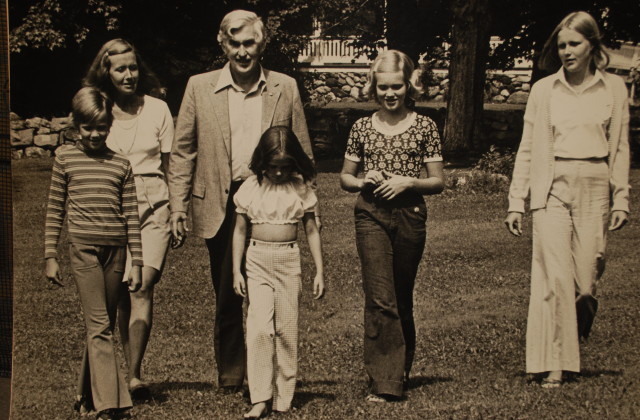Frank Dooley Ends his Reign as Chairman of Democratic Town Committee
By Janet Gokay
Frank Dooley is stepping down this February from his post as chairman of the Norfolk Democratic Town Committee, a position he’s held for over 35 years. It’s been a long run, and by all accounts, an excellent one.
“I’ve been very fortunate in my life,” says Dooley. “I’ve been in the right place, at the right time.”
His political career began at the tender age of three. “My mother carried me in her arms during a torchlight parade for Roosevelt in New Haven,” he said. It was 1932. “And that’s how I first got involved in politics.”
But when Frank began making headlines years later, it was as a swimmer. A High School All-American for three straight years, he was the number one high school swimmer in the country in 1947, and set a world record in 1948 as a member of the 400-yard relay in the national championships. He attended the Ohio State University where he was a three-year All American. In 1952, he was a member of the team that won the gold in the 800-meter relay in the Olympics, in Helsinki. The Marine Corps, in which he was an officer-in-training, featured him (in his Olympic suit) in a recruitment poster shortly before he served in the Korean War.
When Dooley moved to Norfolk in 1962 with his wife, Sue, and two of his (eventual) four daughters, he was an attorney in the law firm of Bob Killian, who was chairman of the Democratic Town Committee in Hartford. Dooley immediately became involved in public service, first as a member of the regional board of education (a post he held for years), and then, two years later, as co-chairman of the Norfolk Democratic Town Committee. In 1967, when Killian was elected Attorney General of Connecticut, Dooley purchased a law practice in Sharon and began devoting more of his time to local services.
In the early 1960’s, Norfolk was a Republican town, but day-to-day affairs were principally run by First Selectman John Curtis, a staunch Democrat, who had a real knack for getting people to do things for him, according to Dooley.
In 1969, Curtis tasked Dooley and Robin Mead with selecting a site for the fire department, then housed in the Royal Arcanum building. “They had two skinny trucks that they parked nose-to-tail outside, and hoses hanging from the walls.” The new firehouse was designed by Russell Childs and built in 1970 by Pete Mulville.
Despite these civic involvements, Dooley wanted to contribute more than political acumen to his new community. In 1965, he began what soon became a cherished town tradition—the summer swim meets at Tobey Pond. “The kids loved it, loved it!” says Sue Dooley. “They all got ribbons.”
Curtis next tapped Dooley and Sue Dyer to co-chair a committee to build a new town hall, which was then located in the old bank building next to Infinity Hall. Four town officials—the town clerk, the tax collector, the probate judge and the assessor shared a small open space. Town records were kept in a single vault. The three first selectmen held court in the kitchen of their secretary, Ruth Lawrence, around the corner on Shepard Road.
The state mandated that the town consolidate and move its records to a safe locale, one that could be accessed by the public. The Dooley and Dyer-led committee, the last in a series devoted to the issue, convinced voters in 1984 to fund a renovation of the old gymnasium on Maple Avenue rather than construct a new cinderblock building on Shepard Road.
Zoning regulations were another area Dooley took under his wing. Common practice in the 1970s and 1980s was for the town to vote in new regulations during the summer, and then vote them out in February, a reflection of differing views between the summer residents and those who lived here year-round.
Meanwhile, he continued his work in state and regional politics. In 1969, Governor John Dempsey appointed him to a commission formed to suggest revisions in the state’s election laws. In 1974, Frank ran for the state senate against longtime incumbent Lew Rome—losing by only 600 votes. Also that year, at Ella Grasso’s bequest, he served on the Democratic State Convention platform committee.
In 1983, Governor William O’Neill appointed Dooley to the state police advisory commission formed in response to alleged police abuses in the Peter Reilly case. In 1985, O’Neill made him chairman of the Criminal Injuries Compensation Board, which later became Victim Services—one of the first in the country.
In Norfolk, Dooley spearheaded efforts to register voters, get out the vote and fill any vacancies with qualified Democrats. “I’m pleased to say that we have the maximum number of people we can have on every board and commission in town.” He also credits annual events, such as the Democrats’ roast beef BBQ at the Downs, with attracting state and local politicians to Norfolk.
Dooley is less than misty-eyed about stepping down. “I’ve been here too long! It’s time for some new leadership,” he said.
There will be a cocktail party to celebrate Frank Dooley’s decades of public service on Saturday, February 7 from 4 to 7 p.m. at the Norfolk Curling Club. Tickets are $15 and may be purchased at the door.

